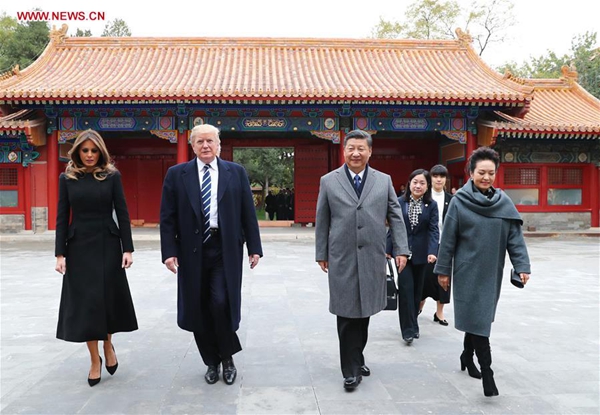Waiting to exhale!
- By Earl Bousquet
 0 Comment(s)
0 Comment(s) Print
Print E-mail China.org.cn, November 19, 2017
E-mail China.org.cn, November 19, 2017
 |
|
Chinese President Xi Jinping (2nd R) and his wife Peng Liyuan (1st R) welcome U.S. President Donald Trump (2nd L) and his wife Melania Trump at the Palace Museum, or the Forbidden City, in Beijing, capital of China, Nov. 8, 2017. They had an informal afternoon tea in the Baoyun Building, also known as the Hall of Embodied Treasures, in the southwestern corner of the Forbidden City. (Xinhua/Xie Huanchi) |
The 2017 China-U.S. summit is over. However, the rest of the world is still holding its collective breath, still very unclear how the relationship will develop between the two countries with the largest economies on Planet Earth.
One thing is clear, though: China is ready to assume a new and more important global role as it embarks on the next phase of its evolution to popular prosperity.
Well ahead of the summit, there were concerns the two leaders might not agree on much, even though Beijing and Washington both promised it would have been fruitful – and they indeed delivered a concordat that's heavy in content.
Yet, here again, it all depends on how they deliver on their declarations of intent.
Both presidents agreed the way forward lies in bilateral economic cooperation and expansion, international trade and cooperation, while continuing close coordination in areas such as financial, currency and exchange rate policies, structural reforms and global economic governance. Even more eye-catching were business deals supposedly worth $250 billion to the United States in reducing its trade deficit.
However, it cannot be ignored that China is still subject to several unilateral and protectionist American measures that are piling-up faster than they are being resolved – the latest being the restriction on imports of Chinese aluminum foil products through crippling new import duties.
Washington had also earlier hit out against Chinese steel exports to the U.S., in addition to repeatedly accusing Beijing of almost every possible economic crime thinkable.
The Xi-Trump discussions have addressed many of the expressed concerns about American companies doing business in China, with Beijing promising to make it easier for international companies to do business in the country, but China still needs to see significant American reciprocity.
One of the main patent reminders from the China-U.S. summit is that economics drives politics in world trade and international financial matters.
Under Xi and Trump, China and the U.S. have entered into a new phase of bilateral and international economic cooperation, which, under normal terms, should last until the end of Trump's initial four-year term.
A strong China-U.S. relationship is essential to global economic stabilization, especially in light of Beijing’s own plans for establishing a moderately prosperous society by 2020 and an advanced socialist country by 2035.
Never mind the opposite claims or denials by U.S. official sources, the real facts and figures will indicate that America benefits more than it is willing to admit from trading with China. American companies doing business with, and in, China in particular are hoping to see conclusion of a Bilateral Investment Treaty (BIT), which they see as beneficial to both countries.
However, with Trump having established a trend of reversing inherited trade agreements – including the North American Free Trade Area (NAFTA) with Canada and Mexico and the U.S.-South Korea Free Trade agreement (KORUS) – there’s still much (understandable) uncertainty about the imminence of BIT, which is not a top priority in Washington today.
From Day One, President Xi insisted that China and the U.S. should be "partners and friends" and not foes, also noting that "while the challenges of bilateral relations are limited, the potential for progress is limitless."
Against that background, Beijing is seeking to turn a new page in China-U.S. ties that can benefit all of humanity, through a common community of deeply intertwined and shared interests, with bigger and heavier responsibilities to safeguard world peace and promote common development.
The highs and lows of the talks between the world's two most powerful leaders notwithstanding, China is keeping its eyes on the future and has indicated that it will not stop or slow-down the opening-up of its economy. That’s reassuring news for all countries and companies interested in doing or increasing business with China.
Yet the rest of the world continues to wait to see concrete results and isn’t willing to breathe out just yet.
Earl Bousquet is a contributor to china.org.cn, editor-at-large of The Diplomatic Courier and author of an online regional newspaper column entitled Chronicles of a Chronic Caribbean Chronicler.
Opinion articles reflect the views of their authors, not necessarily those of China.org.cn.





